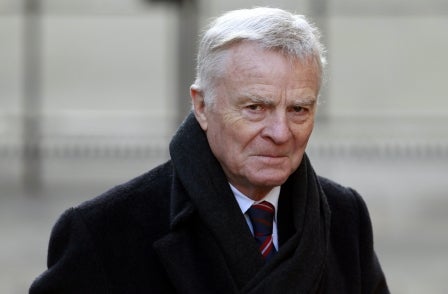
Max Mosley’s attempt to remove all references from Google to a News of the World story about a sadomasochistic sex session has been described as “censorship” by freedom of speech campaigners.
The former Formula One president wants the internet giant to set up a filter to stop images of the Chelsea sex party from appearing on its search results.
In 2008, a High Court judge ruled that the News of the World story had breached Mosley’s privacy, forcing the now defunct newspaper to pay £60,000 in damages on top of costs estimated to be as much as £850,000.
A number of websites have since removed links referring to the original news story but Mosley has gone to court in Paris seeking the removal of references from Google’s own search results.
Index on Censorship has warned that such a move would amount to the censorship of Google.
Padraig Reidy, senior writer at Index, said: “Search engines such as Google are intermediaries not publishers and should not have to remove content unless they are legally obliged to. The legal responsibility for online material lies with the original publisher. Forcing Google and other search engines to filter results would lead to censorship of legitimate information.”
In a blog post following yesterday’s hearing in Paris, Google’s associate general counsel Daphne Keller wrote: “Mr Mosley demands that Google build a filter to screen Google’s index and proactively block pages containing images from our results – without anyone, much less a judge, ever seeing it or understanding the context in which the image appears.
“We sympathise with Mr. Mosley, and with anyone who believes their rights have been violated. We offer well-established tools to help people to remove specific pages from our search results when those pages have clearly been determined to violate the law. In fact, we have removed hundreds of pages for Mr. Mosley, and stand ready to remove others he identifies.
“But the law does not support Mr. Mosley’s demand for the construction of an unprecedented new Internet censorship tool. In repeated rulings, Europe’s highest court has noted that filters are blunt instruments that jeopardise lawful expression and undermine users’ fundamental right to access information. A set of words or images may break the law in one context, but be lawful in another. As an example, a filter might end up censoring news reports about Mr. Mosley’s own court case.
“While constituting a dangerous new censorship tool, the filter would fail to solve Mr. Mosley’s problems.”
But Mosley told the Financial Times: “We make a shopkeeper or a publican responsible for what they sell and to whom. There is no reason not to do the same for internet service providers.
“Google are fighting a completely mad principle. A 10-year-old child after a few minutes reflection could tell you that you simply cannot have a completely open internet: witness child pornography.”
Email pged@pressgazette.co.uk to point out mistakes, provide story tips or send in a letter for publication on our "Letters Page" blog
